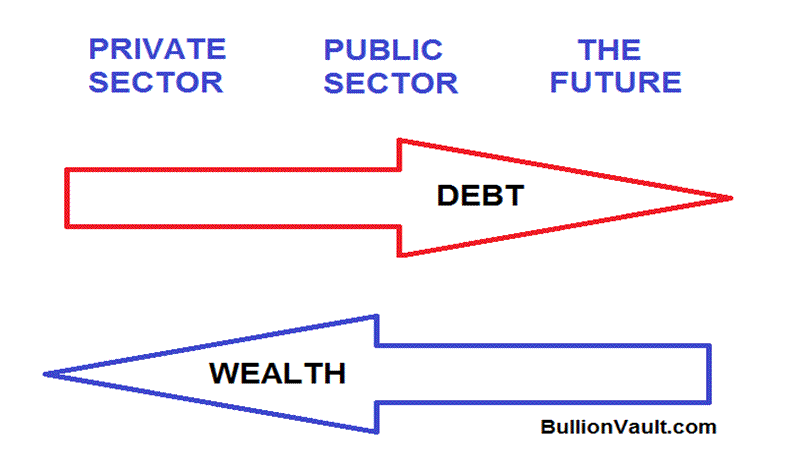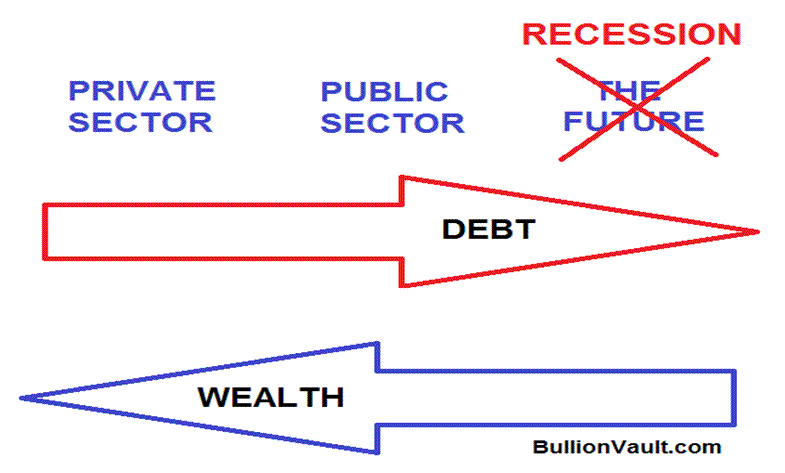Markets Panic, What's Happening?
Stock-Markets / Financial Markets 2011 Sep 24, 2011 - 02:18 AM GMTBy: Ben_Traynor
 Another horrible weak for investors right across the board. What's going on…?
Another horrible weak for investors right across the board. What's going on…?
WE HAVE SEEN another tumultuous week for global markets. Gold prices have been hit hard – with silver prices getting it even worse.
Stocks and commodities have also suffered – while US Treasury bonds have had to put up with Ben Bernanke 'Twisting' them.
The real story, however, is not about gold and silver...or stocks for that matter. The real story features two lead characters: debt and growth. The world economy has too much of the former, and not enough of the latter to pay it off with.
Four news stories – all of which appeared on Friday 23 September – provide a worrying snapshot of where we are in this crisis:
- The Financial Times reports on UK 'mortgage prisoners' – homeowners unable to move because their houses are worth less than what they owe on them, and who are reliant on record low interest rates to make ends meet
- US money market funds are dramatically cutting their exposure to the European banking sector
- The European Union says it will speed up the recapitalization of troubled European banks
- The central bank governors and finance ministers of G20 ministers issue a joint statement committing "to take all necessary actions to preserve the stability of banking systems and financial markets as required."
So far in this crisis, governments and central banks have managed to stave off a depression.
They've done so by undertaking extraordinary measures – record low interest rates, quantitative easing, buying up toxic assets, nationalizing banks, guaranteeing bank deposits etc. The aim was to ward off a debt-deflation spiral and a banking crisis.
We had a recession, and some banks have failed, but the great systemic financial and economic crash has not materialized. Yet.
Policymakers avoided catastrophe in 2008 by transferring private sector debt to the public sector. Some of this was done directly – buying stakes in banks or relieving them of their toxic assets, for example. Other methods were (marginally) more subtle, such as stimulus programs aimed at stirring up some activity in the economic petri dish.
Of course, we all know the governments that undertook these policies didn't just have the money for them lying around. And with recession looming they were hardly likely to raise it from taxation. So, in time-honored fashion, they borrowed it – spending tomorrow's wealth today. In this way, the proceeds of future growth were appropriated for the needs of the present – while the liability for current debt was pushed into the future:

The solution policymakers came up with was to construct a two-way debt-wealth transfer mechanism. For this solution to work, it relies on their being enough future wealth against which to borrow. In other words, you need sustainable growth. It looks increasingly likely, however, that the world's major economies are heading for severe slowdown – with some heading back into recession.
Take China – a byword for miraculous rates of economic growth. Preliminary figures published by HSBC this week suggest China's manufacturing sector – its economic engine for three decades – contracted this month. Beijing-based economist Michael Pettis argues that China's economy will have to rebalance its economy away from government-directed investment and towards private consumption – a bumpy process that could see growth rates more than halve.
Fears are also mounting that China will have its own subprime crisis in housing, and that a bubble in local government debt is set to burst.
As for the west, the debt crisis in the Eurozone is being very well documented right now (see virtually any newspaper this week for further info, or read BullionVault's very own daily market reports).
Of deeper concern, though, is that the Eurozone – along with its economic powerhouse, Germany – also looks to be heading for recession. Preliminary data this week show both the service and manufacturing sectors are slowing in Germany – and contracting in the Eurozone as whole.
German GDP growth dropped to 2.7% year-on-year in the second quarter – a drop from 4.9% in Q1.
Then we have the US, where GDP grew at an annual rate of 1.0% in the second quarter. One of America's great strengths, compared to Europe, may turn out to be its most dangerous flaw. European leaders have been criticized for their slow response to the crisis. The US, as a single nation, has shown itself able to act more decisively.
But swift, decisive action is only an advantage if you're doing the right thing. There's a growing sense that, actually, maybe the people in charge, well, aren't. They themselves don't seem to be sure.
The Bank of England's latest Quarterly Bulletin, which came out this week, contained a paper that looked at how effective quantitative easing has been in Britain. In amongst the various charts and tables are the following cautious paragraphs:
There is considerable uncertainty around the precise magnitude of the impact.
Translation: we don't know if it worked
It is difficult to measure directly the effects of monetary policy measures such as QE and so estimates of those effects are highly uncertain.
Translation: we can't know if it worked
The wider macroeconomic effects of QE are difficult to quantify.
Translation: we don't know what else it might have done
There's nothing inherently wrong with these statements – the Bank's economists are being honest. But these caveats illustrate a fundamental truth about the policy response to this crisis: no one really knows what its effects are.
This is something the Federal Reserve noted this week, when on Wednesday it announced its Operation Twist policy – and announcement that was followed by two days of market turmoil:
The maturity extension program will provide additional stimulus to support the economic recovery but the effect is difficult to estimate precisely.
It's difficult to predict because there's a very realistic chance it won't do anything at all for the economy. Growth could therefore stay mired at 'stall speed' – or even slip into reverse.
Without growth, the debt-wealth transfer mechanism breaks down:

This, in fact, may be what we're seeing right now – and why the markets have had such a torrid time lately. We are watching a patched-together, hastily constructed machine fall apart in front of our eyes.
What will happen next? How will policymakers deal with debt if they can't rely on growth? And how might gold owners respond to all this turmoil? Find out more in Part Two next week...
By Ben Traynor
BullionVault.com
Gold price chart, no delay | Buy gold online at live prices
Editor of Gold News, the analysis and investment research site from world-leading gold ownership service BullionVault, Ben Traynor was formerly editor of the Fleet Street Letter, the UK's longest-running investment letter. A Cambridge economics graduate, he is a professional writer and editor with a specialist interest in monetary economics.
(c) BullionVault 2011
Please Note: This article is to inform your thinking, not lead it. Only you can decide the best place for your money, and any decision you make will put your money at risk. Information or data included here may have already been overtaken by events – and must be verified elsewhere – should you choose to act on it.
© 2005-2022 http://www.MarketOracle.co.uk - The Market Oracle is a FREE Daily Financial Markets Analysis & Forecasting online publication.



